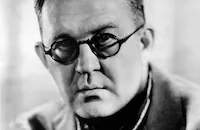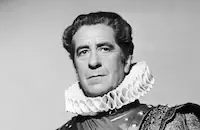Pilgrimage
Brief Synopsis
Cast & Crew
John Ford
Henrietta Crosman
Heather Angel
Norman Foster
Marian Nixon
Maurice Murphy
Film Details
Technical Specs

Synopsis
During World War I, in the small farming community of Three Cedars, Arkansas, Jim Jessop wants to wed Mary Saunders, but his proud and protective mother Hannah considers Mary to be "trash." To break up the romance, Hannah signs a waiver allowing Jim to enlist to fight in France. Sometime after Jim has left for Europe, Hannah delivers Mary's baby during a snow storm, but she vows that the baby will never bear the Jessop name. Jim dies in France, and when Hannah gets the news, she sadly puts together pieces of Jim's torn portrait. Ten years later, Hannah ignores Mary's child Jimmy. Prodded by Elmer Briggs, the mayor, to represent the area in a pilgrimage to see her son's grave in France, Hannah joins other "Gold Star" mothers from various ethnic groups and parts of the United States, and travels to France. The women are given a fashion show, treated to a beauty salon and shown the Paris sights. After a ceremony at the Arc de Triomphe , Hannah declares that she will not go to the cemetery the next day because she doesn't belong with the others who had "good" sons. That night, as she despondently walks over a bridge, Hannah sees a drunken, wealthy American boy about to jump. She takes the boy, Gary Worth, to his hotel and stays with him until he sobers up. After reprimanding Gary, Hannah learns that his mother plans to separate him from Suzanne, the girl he loves, whom his mother considers beneath them. Hannah overhears Suzanne confess that she is pregnant and then goes to meet Mrs. Worth. She effects a reconciliation and then goes to the Argonne and cries on Jim's grave. At home, Hannah receives Mary's forgiveness and reconciles with Jimmy.

Director

John Ford
Cast
Henrietta Crosman

Heather Angel

Norman Foster

Marian Nixon
Maurice Murphy

Lucille La Verne

Hedda Hopper

Robert Warwick
Louise Carter
Betty Blythe
Francis Ford
Jay Ward
Frances Rich
Adele Watson
Inez Palange
Rosa Rosanova
Greta Meyer
Margaret Mann
Frances Morris
Shirlé Palmer
Beatrice Roberts
Sarah Padden
Crew
Ernest R. Ball
J. Keirn Brennan
William Collier Sr.
Barry Connors
William Darling
Curt Fetters
James Gordon
Eugene Grossman
Kate Horton
Henry Johnson
Samuel Kaylin
Philip Klein
Lou Kunkel
W. W. Lindsay Jr.
Louis Loeffler
Earl Luick
Dudley Nichols
Ed O'fearna
George Schneiderman
Basil Woon
I. A. R. Wylie

Film Details
Technical Specs

Articles
Pilgrimage
Hannah Jessop (Henrietta Crosman) is a widow struggling to maintain her farm in Three Cedars, Arkansas. She is troubled by her son Jim (Norman Foster), who yearns to escape from the daily toil by either enlisting in the army or marrying his sweetheart, Mary Saunders (Marian Nixon). When Jim defies his mother and declares his love for Mary, Hannah separates them by enlisting Jim in the service, and having him sent to fight in World War I. Jim is killed in action when a trench collapses upon his squad. Hannah learns that Mary has given birth to Jim's child, but does not acknowledge Jimmy (Jay Ward) as her grandson, preferring that he bear the shame of illegitimacy.
Years pass and Hannah is invited to take a trip to France with the "Gold Star Mothers," an envoy of women who lost their children to the war, and who are being ceremoniously taken to visit their sons' graves. On board the ship of mothers (whose ethnic diversity represents the melting pot of American culture), Hannah begins to feel shame for maliciously sending Jim to war. Separating herself from the group in France, Hannah meets Gary Worth (Maurice Murphy), a young American who is contemplating suicide because his mother forbids his relationship with a lower-caste French woman (Heather Angel). Hannah finds that, through Gary, she is able to seek absolution for her sin of maternal selfishness. And she thus endeavors to patch up the rift in the Worth family, before finishing the pilgrimage to her son's grave, and returning to face her grandchild.
Pilgrimage was based on a story by I.A.R. Wylie, whose "Grandma Bernle Learns Her Letters" had been the foundation of one of Ford's most celebrated films, the WWI drama Four Sons (1928). Another story of wartime loss and reconciliation, Four Sons concerned a Bavarian widow whose children go to battle in World War I -- three in the German army and one in the American infantry.
No doubt earmarking it as another Ford project in a similar vein, Fox purchased screen rights to the story "Pilgrimage" in November 1931, prior to its November 1932 publication in The American Magazine. But by the time Fox had purchased the story, they had lost the director. In 1931, Ford ended his longtime association with Fox in order to test the waters at other studios, directing films for Samuel Goldwyn, Universal, and MGM. This period of wanderlust didn't last long and within two years he had returned to Fox, the studio where he had first found notoriety.
Like many other filmmakers of the time, Ford had been greatly influenced by the film Sunrise (1927), made at Fox by German director F.W. Murnau. Immediately after the release of the film -- generally regarded as the finest of the silent era -- Ford's work began to reflect the dark expressionist-influenced cinematography, stylized sets, and the slowly tracking camera. The resemblance between Pilgrimage and Sunrise is especially obvious in the scene in which the farm boy sneaks out of the house to meet his forbidden love in a fog-enshrouded field (a scene that appears almost identically in Sunrise). Ford did not consistently pattern his visual style upon Murnau's, but it is clearly evidenced in such films as Four Sons, Arrowsmith (1931), and The Informer (1935).
Just before Pilgrimage went into production, Fox received a letter from Katherine Gallagher, vice-president of the actual Gold Star Mothers, who wrote, "The pilgrimage was very sacred to us and we may not wish it to be commercialized." It is unclear whether or not the studio invited the group to serve as consultants or made any effort to assuage their concerns.
Filming began in mid-February of 1933, but was stopped about a month later, due to the shutdown of the Fox Film Corp., one of several studios trying to avoid bankruptcy during the Great Depression. The studios managed to keep the doors open by negotiating pay cuts with its employees, but cynics believe this was just a ploy for studio management to carve a greater share of profits for itself. Regardless, production of Pilgrimage resumed on March 20, and continued through early April.
This seemingly wholesome and noble film was not above censorship. The MPPDA (The Hays Office) objected to the word "hell" being spoken twice in the film, as well as the sound of a toilet flushing on board the ship. To appease the Production Code-enforcers, the offensive bits of audio were summarily removed from the film.
Originally, Ford wanted to cast in the lead silent movie veteran Mae Marsh, who had appeared in numerous films by Ford's idol, director D.W. Griffith, including Intolerance (1916) and The Birth of a Nation (1915). The studio reportedly nixed Ford's choice, and the role went instead to Crosman. Ford would work with Marsh on at least 18 films, though she usually appeared as an uncredited extra, in such films as My Darling Clementine (1946) and Donovan's Reef (1963).
Crosman was born on September 2, 1861, in Wheeling, West Virginia, the grand-niece of composer Stephen Foster. She found fame on Broadway in 1900 in the titular role of Mistress Nell, then as Rosalind in Shakespeare's As You Like It, produced by Major Maurice Campbell (who was her manager and second husband). A steady stream of stage roles followed for two decades. During this time she dabbled in film, but remained dedicated to the stage. In 1932 she decided to pursue film work full time, and signed a contract with Fox from 1932-36. She played mostly supporting roles (as aging relatives) and retired from film after her contract expired. She died on October 31, 1944.
Appearing at the film's New York premiere, Crosman said to the audience at the Gaiety Theater, "If you like Hannah Jessup, you make me the happiest woman in New York." The New York Times responded, "This morning, she has had her wish... Miss Crosman, by some strange magic of her own, makes the old, commonplace virtues of motherhood not only dramatic, but fresh and clean and very touching."
Pilgrimage features appearances by several of Ford's regular supporting cast, including his older brother Francis Ford (as the mayor of Three Cedars) and Jack Pennick. Though one may not recognize Pennick's name, his thick-featured face is familiar to everyone who has seen several of Ford's films. A former Marine, Pennick often served as technical advisor on films with military themes. In Pilgrimage, he is the soldier on the military transport train who announces a brief stop in Jim's home town. "Three minutes! One for each cedar."
Legendary gossip columnist (and notorious red-baiter) Hedda Hopper appears as Gary's closed-minded mother. Still five years away from becoming a newspaper columnist, Hopper was staying busy as a character actor, generally cast as stuffy, upper-crust women.
Ford had a reputation for teasing and bullying his actors. Some believe this was his way of forcing a certain style of performance from an unexpressive actor, but all too often his cruelty seems motivated by sport. Foster (who would never become one of Ford's regular players) was a victim of the director's abusive tendencies. According to McBride, Ford "bullied and ridiculed him throughout the shooting of Pilgrimage," calling him "Jasper" rather than Norman. "Finally, at the end of the shooting, he asked Ford why he called him 'Jasper.' Ford pointed to the black janitor who had been quietly sweeping the floor of the soundstage every day. 'See him?' the director said, 'His name is Jasper.'"
Throughout his career, Ford's films have a reverent, almost maudlin attitude toward mothers. One glimpses it at times in Pilgrimage, particularly in the multi-cultural Gold Star Mothers who bear their crosses with all the steely stoicism (spiced with knee-slapping humor) of Ma Joad in Ford's The Grapes of Wrath (1940). Ironically, Hannah is not viewed with such awe and respect. She is probably the most unsympathetic mother ever to appear in a John Ford picture -- which makes it all the more poignant to see her brittle pride crumble by film's end. If she parallels anyone else in the director's oeuvre, it would be the cold-hearted Ethan Edwards in The Searchers (1956), who commands our attention even as he resists our empathy.
The poignancy of Pilgrimage is compounded by the fact that Ford's own mother died on March 26, 1933, in the midst of production. "His awareness of his mother's impending mortality," wrote McBride, "may help explain why he invested such profound emotion in Pilgrimage."
Director: John Ford
Screenplay: Philip Klein and Barry Connors (dialogue by Dudley Nichols)
Based on a story by I.A.R. Wylie
Cinematography: George Schneiderman
Production Design: William Darling
Music: Samuel Kaylin
Cast: Henrietta Crosman (Hannah Jessop), Norman Foster (Jim Jessop), Maurice Murphy (Gary Worth), Marian Nixon (Mary Saunders), Jay Ward (Jimmy Saunders), Heather Angel (Suzanne), Francis Ford (Mayor Briggs).
BW-96m.
by Bret Wood

Pilgrimage
Quotes
Trivia
Notes
According to information in the Twentieth Century-Fox Records of the Legal Department at the UCLA Theater Arts Library, Fox bought the motion picture rights to the story in November 1931, when it was an unpublished, uncopyrighted story. The legal records also reveal that William Collier, Sr. was originally cast as "The Mayor," a role that Francis Ford took over; and that Esther Michelson was originally cast as "The Jewish Mother," which Rosa Rosanova played in the final film. Although Eugene Grossman is credited as sound recorder on the screen, W. W. Lindsay, Jr. is listed in studio records and in two reviews, and the film is listed in his filmography in Film Daily Year Book, but not in Grossman's. According to a Film Daily news item, Minna Gombell and Frank Craven were originally scheduled to be in the film. According to a Hollywood Reporter news item, Henrietta Crosman was transferred during pre-production from this film to Mommies, a film that was never made. Crosman appeared in person at the New York premiere.
According to information in the MPAA/PCA Collection at the AMPAS Library, Hays Office officials complained about two uses of the word "hell" and an action in the ship's stateroom in which Crosman pushes a button and the flushing of a toilet is heard. A Fox official subsequently wrote the Hays Office to report that the word "hell" and the toilet flush were eliminated from the soundtrack. Hays Office officials also were worried about a possible negative French reaction to a scene in which a girl explains that an old bewhiskered man who is pitching manure in front of his doorway is the mayor of the town. Because of this concern, Fox president Sidney Kent, on May 18, 1933, issued an order that the reference made to the French mayor working on a dung pile be eliminated from the negative. The Hays Office files for the film also include a letter dated January 23, 1933 from Katherine M. Gallagher, Vice-President, American Gold Star Mothers, of Wayne, PA to Fox, which stated that she was the sole instigator of the movement to get a bill passed to enable the Mothers to go to France, which resulted in the pilgrimage that was the subject of Fox's film. Gallagher asked that the studio consult her organization because, "The pilgrimage was very sacred to us and we May not wish it to be commercialized." No information has been located concerning any subsequent input that the group May have had.














